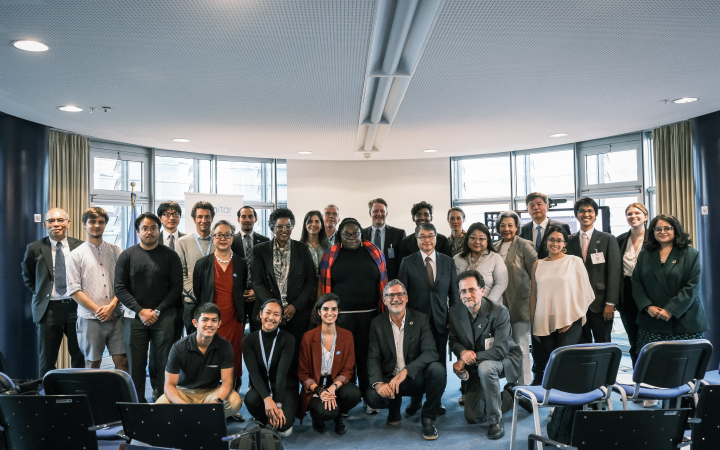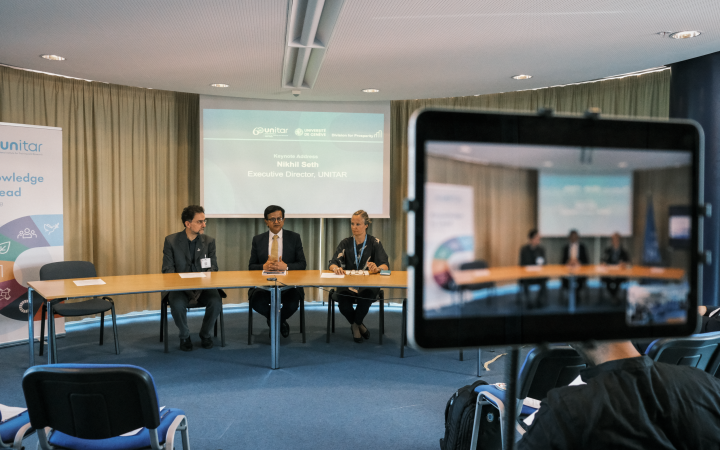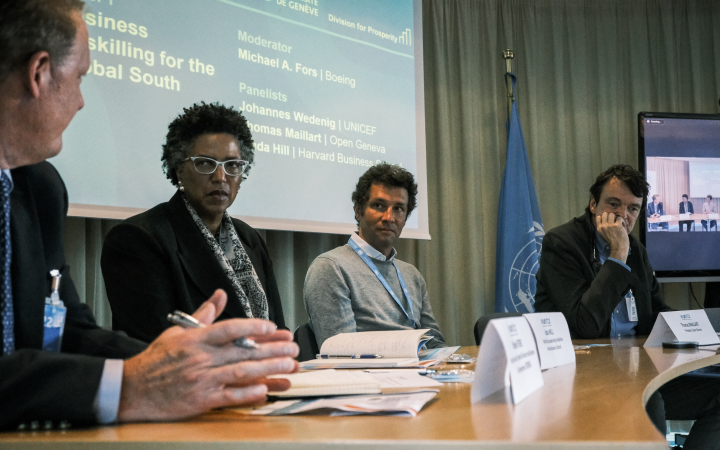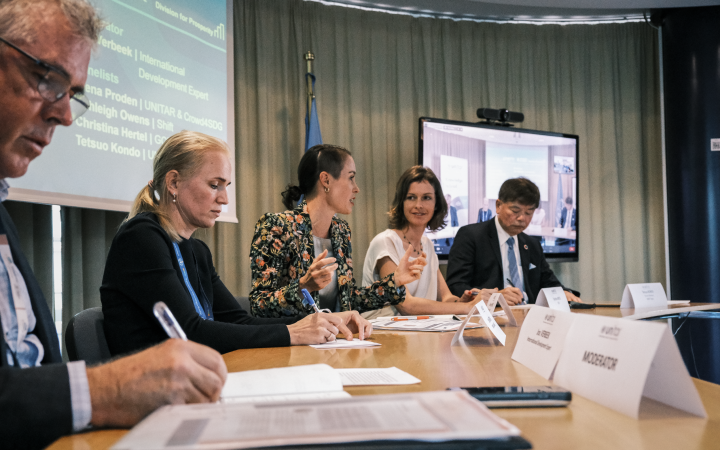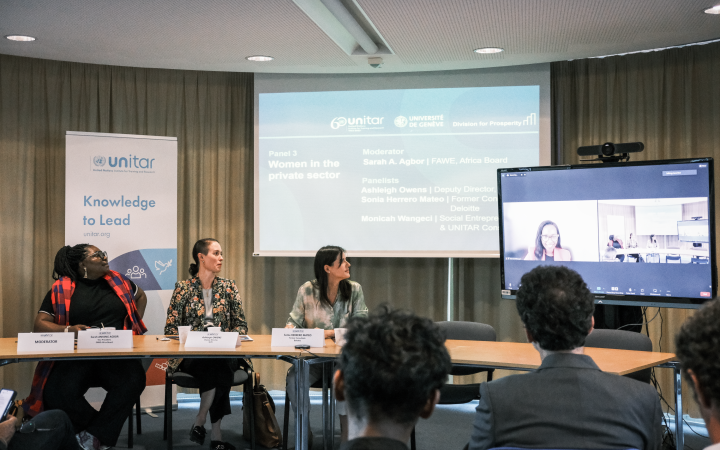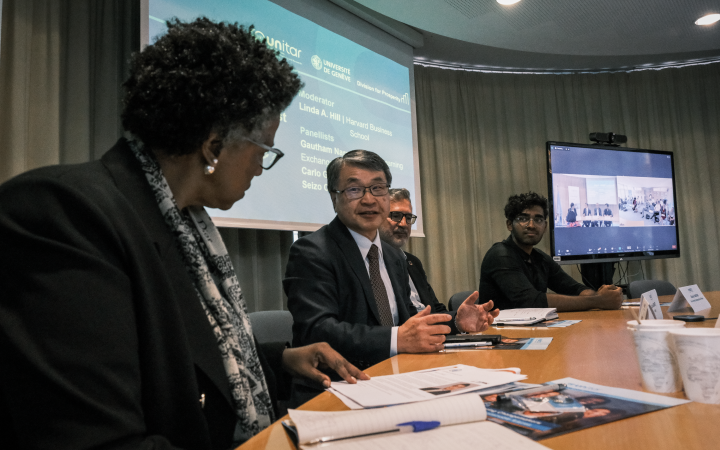- On 3 October 2023, UNITAR, in partnership with the University of Geneva, hosted a 60th-anniversary public forum “Scaling Responsible Entrepreneurship and Solutions to Global Challenges” and featured members of the Division for Prosperity Advisory Board.
- As part of UNITAR’s 60th anniversary celebrations, this public forum focused on the challenges, best practices, and ways forward to generate prosperity through responsible entrepreneurship and innovation for the Sustainable Development Goals (SDGs).
- The event brought together individuals and organizations from Geneva, home to more than 600 international organizations, to foster public-private partnerships to accelerate progress towards the SDGs.
24 November 2023, Hiroshima, Japan - On 3 October 2023, UNITAR, in partnership with the University of Geneva, hosted a public forum “Scaling Responsible Entrepreneurship and Solutions to Global Challenges”. The forum was part of UNITAR’s 60th anniversary celebration and featured members of the UNITAR Division for Prosperity Advisory Board.
The event brought together individuals and organizations from Geneva, home to more than 600 international organizations, to foster public-private partnerships to accelerate progress towards the SDGs.
Nikhil Seth, Executive Director of UNITAR, opened the event by highlighting the gaps between men and women in access to technology and the impact of technology on learning. He also expressed his hope that the scientific method of asking questions and testing hypotheses would become better integrated into global policymaking.
I am very enthused by [this forum’s] programme because this is the heart of what we hope to achieve in the years to come: reach more vulnerable countries, reach more vulnerable people, with practical things that enhance [their lives].” —Nikhil Seth, Executive Director, UNITAR
Mr. Seth acknowledged the contributions of the UNITAR Division for Prosperity Advisory Board in guiding the Division’s work to reach the future through entrepreneurship, women’s empowerment, and partnerships, particularly with technology companies and big businesses.
SESSION 1: BUSINESS UPSKILLING FOR THE GLOBAL SOUTH
Moderator
Michael A. Fors, Executive Leader, Corporate Division and Business Unit Development, Boeing, and UNITAR Division for Prosperity Advisory Board Member
Panellists
- Johannes Wedenig, UNICEF Director – Project Leader YOMA
- Thomas Maillart, Open Geneva
- Linda Hill, Harvard Business School, and UNITAR Division for Prosperity Advisory Board Member
The first session focused on the role of businesses and upskilling to foster sustainable development in the Global South. Scaling is especially important in countries with large young populations. Young people in the Global South, according to Mr. Wedenig, were held back by fragmentation and the lack of opportunities. Creating social links is especially important for young entrepreneurs, Mr. Maillart pointed out.
Entrepreneurship should be more community-based: get people to start doing things together, create a social fabric, create a sense of bonding, maybe experience joy and happiness and thrill in doing things and seeing things positively.” —Thomas Maillart, Open Geneva
Ms. Hill noted that entrepreneurs can bring more diversity into organizations. They can pay workers a living wage, support people in moving into new roles, and help people lift themselves out of poverty.
Mr. Fors concluded the session by saying acquiring skills – including in technology and AI – will be valuable currency for the people in the Global South and their future careers. Social entrepreneurship and responsible entrepreneurship can help individuals build their skills and work as teams to address major problems.
The more that we can help those social entrepreneurs advance [their] skills and scale their business model, then we can have a more scaled impact on the world.” —Michael A. Fors, Executive Leader, Corporate Division and Business Unit Development, Boeing, and UNITAR Division for Prosperity Advisory Board Member
SESSION 2: MEASURING SDGS IMPACT AND DATA FOR RESPONSIBLE ENTREPRENEURSHIP
Moderator
Jos Verbeek, manager / international development expert and UNITAR Division for Prosperity Advisory Board Member
Panellists
- Elena Proden, Division for Satellite Analysis and Applied Research Specialist, UNITAR, and Crowd4SDG project member
- Christina Hertel, Director, Geneva Centre for Responsible Entrepreneurship
- Ashleigh Owens, Senior Advisor, Shift, and UNITAR Division for Prosperity Advisory Board Member
- Tetsuo Kondo, former Director of the United Nations Development Programme (UNDP) Representation Office in Tokyo, and UNITAR Division for Prosperity Advisory Board Member
This session focused on how we can measure the impact of the SDGs and what data we need to ensure that we are reaching our goals. Mr. Verbeek said that we especially need to look at indicators that tell about inequalities.
“We need to be looking at … metrics that talk to us about inequality: inequalities within countries and inequalities between countries.” —Jos Verbeek, international development expert and UNITAR Division for Prosperity Advisory Board Member
Ms. Proden introduced Citizen Science data, which engages citizens to fill critical data gaps on marginalized groups. The local data can then be used to identify actions needed to reach the SDGs.
Ms Owens pointed out that 70% of companies report on inputs and activities instead of addressing their impact on people. Businesses could for example look at the percentage of permanent versus temporary contracts for employees, the ratio of CEO to median pay, and gender and racial pay gaps.
Ms. Hertel emphasized how entrepreneurs need to understand the potential effects of their business solutions. She highlighted that measuring impact is at the core of impact-oriented businesses and called for reporting that is publicly available and that transparently addresses the challenges the business faces.
Mr. Kondo explained how impact management, intelligence and impact of facilitation can only come from qualitative assessments.
SESSION 3: WOMEN IN THE PRIVATE SECTOR
Moderator
Sarah Anyang Agbor, Vice President, Forum for African Women Educationalists (FAWE) Africa Board, and UNITAR Division for Prosperity Advisory Board Member
Panellists
- Sonia Herrero Mateo, consultant, formerly with Deloitte
- Ashleigh Owens, Senior Advisor, Shift, and UNITAR Division for Prosperity Advisory Board Member
- Monicah Wangeci, social entrepreneur and UNITAR programme coordinator
Gender equality cannot be achieved without support from the private sector. Ms. Agbor opened the session by asking, “How can we achieve and reinforce gender inclusivity to advance the SDGs in the private sector?”
Ms. Wangeci pointed out that digital inclusion, especially in technology and finance, is crucial. Women also need greater access to finance and to be paid for caregiving duties. She urged businesses to consider how women perceive innovation and called for policies that ensure that women’s recruitment, promotion, and retention rates are the same as men’s.
We need to find a balanced landscape where if you are a [woman] and you’re married, you can [still] pursue your dreams.” —Monicah Wangeci, social entrepreneur and UNITAR programme coordinator
Ms. Mateo highlighted the need for commitment from top management, with gender equality embedded in the company’s mission and regular reporting built on continuous employee feedback. She also called for the need to counter stereotypes.
Ms. Owens studied the financial sector and found a high concentration of women in roles related to corporate sustainable social responsibility, compared to a male-dominated trading floor. She said that organizations should recognize and value the unique skills that women bring to their roles.
Ms. Agbor concluded by saying that to achieve the reality that we want, we need the private sector to own and lead actions to reach their gender-equality goals and governments to set appropriate policies and strategies, and for all genders to work hand-in-hand.
SESSION 4: EMPOWERING ECONOMIES OF TRUST AND BRIDGING THE DIGITAL DIVIDE
Moderator
Linda A. Hill, Wallace Brett Donham Professor of Business Administration, Faculty Chair, Leadership Initiative, Harvard Business School, and UNITAR Division for Prosperity Advisory Board Member
Panellists
- Gautham Varada Narayan, Project Officer, Swiss Learning Exchange, and Founder of Bus Ya Faraha start-up
- Carlo Giardinetti, Consulting Sustainability Lead, Deloitte
- Seizo Onoe, Director of Telecommunications Standardization Bureau, ITU
- Anna Jablonska, Managing Partner, DACH, Tenderhut
In today’s world, the digital divide is a problem of social justice, particularly for those already burdened with disadvantage and marginalization. Bridging the digital divide requires greater access to technology and engaging people from disadvantaged groups in content creation.
Mr Onoe noted that creating the infrastructure to help people get online could be an opportunity for new business. Mr. Giardinetti raised concerns regarding the dominance of technology industries in today’s economic landscape.
Mr Narayan argued for greater recognition of the role of the community – especially when bringing technology to developing countries. He called for technology projects that are community-based.
Ms. Hill asked, “Co-creation is collaboration, experimentation, and learning. Can we do that collectively with people who are different from us?” Mr. Giardinetti pointed out that it is crucial to cooperate with multiple stakeholders to address systemic challenges. This involves building trust, finding the right experts and working together – rather than as individuals – to advance the global agenda. Mr. Narayan noted the role of cultural heritage and creating a network of cultures.
About UNITAR
The United Nations Institute for Training and Research (UNITAR) is a dedicated training arm of the United Nations. In 2022, UNITAR trained over 395,000 learners around the world to support their actions for a better future. In addition to our headquarters in Geneva, we have offices in Hiroshima, New York and Bonn and networks around the world.
The Division for Prosperity is based in the Hiroshima Office and Geneva. We seek to shape an inclusive, sustainable and prosperous world through world-class learning and knowledge-sharing services on entrepreneurship, leadership, finance and trade, digital technologies, and nuclear disarmament and non-proliferation. We empower individuals from least-developed countries, countries emerging from conflict, and small-island developing states – especially women and young people – to bring about positive change.
United Nations Online Volunteers Lai Man Yip and Belinda Tsibande contributed to this article.


